Descriptive Essay Writing

Descriptive Essay Examples

Amazing Descriptive Essay Examples for Your Help
Published on: Jun 21, 2023
Last updated on: Nov 19, 2024
-8521.jpg)
People also read
Interesting Descriptive Essay Topics - 2024
Writing a Descriptive Essay Outline - Tips & Examples
Descriptive Essay: Definition, Tips & Examples
Share this article
Descriptive essays are very commonly assigned essays. This type of essay enhances students' writing skills and allows them to think critically.
A descriptive essay is often referred to as the parent essay type. Other essays like argumentative essays, narrative essays, and expository essays fall into descriptive essays. Also, this essay helps the student enhance their ability to imagine the whole scene in mind by appealing senses.
It is assigned to high school students and all other students at different academic levels. Students make use of the human senses like touch, smell, etc., to make the descriptive essay more engaging for the readers.
On This Page On This Page -->
Examples make it easy for readers to understand things in a better way. Also, in a descriptive essay, different types of descriptions can be discussed.

Need a Perfect Descriptive Essay? We Can Write It!
Here are some amazing examples of a descriptive essay to make the concept easier for you.
Descriptive Essay Example 5 Paragraph
5 paragraphs essay writing format is the most common method of composing an essay. This format has 5 paragraphs in total. The sequence of the paragraphs is as follows;
- Introduction
- Body Paragraph 1
- Body Paragraph 2
- Body Paragraph 3
- Conclusion
Following is an example of a descriptive essay written using the famous 5 paragraph method.
5 Paragraph Descriptive Essay
Descriptive Essay Example About A Person
Descriptive essays are the best option when it comes to describing and writing about a person. A descriptive essay is written using the five human senses. It helps in creating a vivid image in the reader’s mind and understanding what the writer is trying to convey.
Here is one of the best descriptive essay examples about a person. Read it thoroughly and try to understand how a good descriptive essay is written on someone’s personality.
Descriptive Essay Example About a Person
Descriptive Essay Example About A Place
If you have visited a good holiday spot or any other place and want to let your friends know about it. A descriptive essay can help you explain every detail and moment you had at that place.
Here is one of the good descriptive essay examples about a place. Use it as a sample and learn how you can write such an essay.
Descriptive Essay Example for Grade 6
Descriptive essays are frequently assigned to school students. This type of essay helps the students enhance their writing skills and helps them see things in a more analytical way.
If you are a 6 grader and looking for a good descriptive essay example, you are in the right place.
Descriptive Essay Example for Grade 7
Here is one of the best descriptive essay examples for grade 7.
Descriptive Essay Example for Grade 8
If you are looking for some amazing descriptive essay examples for grade 8, you have already found one. Look at the given example and see what a well-written descriptive essay looks like.
Descriptive Essay Example for Grade 10
Essay writing is an inevitable part of a student's academic life . No matter your grade, you will get to write some sort of essay at least once.
Here is an example of a descriptive essay writing for grade10. If you are also a student of this grade, this example might help you to complete your assignment.
Descriptive Essay Example for Grade 12
If you are a senior student and looking for some essay examples, you are exactly where you should be.
Use the below-mentioned example and learn how to write a good essay according to the instructions given to you.
Descriptive Essay Example College
Descriptive essays are a great way to teach students how they can become better writers. Writing a descriptive essay encourages them to see the world more analytically.
Below is an example that will help you and make your writing process easy.
College Descriptive Essay Example
Descriptive Essay Example for University
Descriptive essays are assigned to students at all academic levels. University students are also assigned descriptive essay writing assignments. As they are students of higher educational levels, they are often given a bit of difficult and more descriptive topics.
See the example below and know what a descriptive essay at the university level looks like.
Short Descriptive Essay Example
Every time a descriptive essay isn't written in detail. It depends on the topic of how long the essay will be.
For instance, look at one of the short descriptive essay examples given below. See how the writer has conveyed the concept in a composed way.
Objective Descriptive Essay Example
When writing an objective description essay, you focus on describing the object without conveying your emotions, feelings, or personal reactions. The writer uses sight, sound, or touch for readers' minds to bring life into pictures that were painted by words.
Here is an example that you can use for your help.
Narrative and Descriptive Essay Example
A narrative descriptive essay can be a great way to share your experiences with others. It is a story that teaches a lesson you have learned. The following is an example of a perfect narrative descriptive essay to help you get started.
How to Start a Descriptive Essay? - Example
If you don't know how to start your descriptive essay, check this example and create a perfect one.
How to Start a Descriptive Essay - Example

Not Sure How to Begin Your Essay? Let Us Help!
Subjective Descriptive Essay Example
It is a common concept that a descriptive essay revolves around one subject. Be it a place, person, event, or any other object you can think of.
Following is one of the subjective descriptive, easy examples. Use it as a guide to writing an effective descriptive essay yourself.
Writing a descriptive essay is a time-consuming yet tricky task. It needs some very strong writing, analytical, and critical thinking skills. Also, this is a type of essay that a student can not avoid and bypass.
But if you think wisely, work smart, and stay calm, you can get over it easily. Learn how to write a descriptive essay from a short guide given below.
How to Write a Descriptive Essay?
A writer writes a descriptive essay from their knowledge and imaginative mind. In this essay, the writer describes what he has seen or experienced, or ever heard from someone. For a descriptive essay, it is important to stay focused on one point. Also, the writer should use figurative language so that the reader can imagine the situation in mind.
The following are some very basic yet important steps that can help you write an amazing descriptive essay easily.
- Choose a Topic
For a descriptive essay, you must choose a vast topic to allow you to express yourself freely. Also, make sure that the topic you choose is not overdone. An overdone will not grab the attention of your intended audience. Check out our descriptive essay topics blog for a variety of intriguing topic suggestions.
- Create a Strong Thesis Statement
A thesis statement is the essence of any academic writing. When you select the descriptive essay topic, then you create a strong thesis statement for your essay.
A thesis statement is a sentence or two that explains the whole idea of your essay to the reader. It is stated in the introductory paragraph of the essay. The word choice for creating the thesis statement must be very expressive, composed, and meaningful. Also, use vivid language for the thesis statement.
- Collect the Necessary Information
Once you have created the thesis statement and are done writing your essay introduction . Now, it's time to move toward the body paragraphs.
Collect all necessary information related to your topic. You would be adding this information to your essay to support your thesis statement. Make sure that you collect information from authentic sources.
To enhance your essay, make use of some adjectives and adverbs. To make your descriptive essay more vivid, try to incorporate sensory details like touch, taste, sight, and smell.
- Create a Descriptive Essay Outline
An outline is yet another necessary element of your college essay. By reading the descriptive essay outline , the reader feels a sense of logic and a guide for the essay.
In the outline, you need to write an introduction, thesis statement, body paragraphs and end up with a formal conclusion.
Proofreading is a simple procedure in which the writer revises the written essay. This is done in order to rectify the document for any kind of spelling or grammatical mistakes. Thus, proofreading makes high-quality content and gives a professional touch to it.
You might be uncertain about writing a good enough descriptive essay and impress your teacher. However, it is very common, so you do not need to stress out.
Hit us up at CollegeEssay.org and get an essay written timely by our professional descriptive essay writing service .
Our essay writing service for students aims to help clients in every way possible and ease their stress. Get in touch with our customer support team, and they will take care of all your queries related to your writing.
You can always enhance your writing skills by leveraging the power of our AI essay writing tools .
Place your order now and let all your stress go away in a blink!
Barbara P (Literature)
Barbara is a highly educated and qualified author with a Ph.D. in public health from an Ivy League university. She has spent a significant amount of time working in the medical field, conducting a thorough study on a variety of health issues. Her work has been published in several major publications.
Need Help With Your Essay?
Also get FREE title page, Turnitin report, unlimited revisions, and more!
Keep reading

OFF ON CUSTOM ESSAYS
Essay Services
- Argumentative Essay Service
- Descriptive Essay Service
- Persuasive Essay Service
- Narrative Essay Service
- Analytical Essay Service
- Expository Essay Service
- Comparison Essay Service
Writing Help
- Term Paper Writing Help
- Research Writing Help
- Thesis Help
- Dissertation Help
- Report Writing Help
- Speech Writing Help
- Assignment Help
Legal & Policies
- Privacy Policy
- Cookies Policy
- Terms of Use
- Refunds & Cancellations
- Our Writers
- Success Stories
- Our Guarantees
- Affiliate Program
- Referral Program
Disclaimer: All client orders are completed by our team of highly qualified human writers. The essays and papers provided by us are not to be used for submission but rather as learning models only.
Essay – examples & model answers | B2 First (FCE)
FCE Essay Examples: Topic (Environment)
Example exam task:, example answer (grade: 3), example answer:.
I think that my country has problems with pollution to the environment like all other countries. This problem is normal for Russia. We have big problems with transport because there are too much cars in our country. And because of that we have problems with atmospeer, air in my city and in all Russia is really dirty and sometimes I can’t make a sigh because it smells around me and of course around that cars on the road. I’ve heard about tradition of one country. They don’t go anywhere by car one day a month or a year, they just use bycicle or their feet. I think it could be very good if we had a tradition like that.
So, what about the rivers and the seas? Yeah, there are some really good and clean rivers and seas where you can go, but there are not many of them. Once I saw the river OB in my city, it was about two years ago but I stil remember that in some places it was not blue, it was green or purple I didn’t really understand because it had different colours.
I don’t know what should we do. Maybe we should just open our eyes and look what we did. But Russian people don’t care about the world around them many people care only about themselves an that’s all.
So, the best idea is look around and try to do something good for our planet and for us and our children.
FCE, CAE, CPE
Practice, write & improve, examiners comments & grade:, example answer (grade: 3-4).
To begin with pollution and damage to the environment is the most serious and difficult problem for countries of all over the world. Scientists of different countries predict a global ecocatastrophe if people won’t change their attitude to our planet.
First of all a huge damage to the environment brings a transport. People can’t imagine their living without cars, buses, trains, ships and planes. But it’s an open secret that one of disadvantage of these accustomed things is harmful exhaust. Needless to say that use of environment friendly engines helps us to save atmosphere from pollution.
In addition to this our rivers and seas are in not less danger situation. It’s a fact of common knowledge that numerous factories and plants pour off their waste to ponds. Obviously that cleaning manufacturing water helps to avoid extinction of ocean residents.
Apart from this I’m inclined to believe that every person can and must contribute to solving this important problem. Doing a little steps for protection our environment every day we will be able to save our Earth. And it’s a task of each of us.
Model Answer (Grade: 5)
DEVELOPMENT VS ENVIRONMENT
If we surf the web looking for pollution and environmental catastrophes, we will find out that every country in the world suffers them. This is a natural consequence of the struggle between development and environment.
If a country decided to live isolated from the rest of the world, living on what it can naturally grow and produce, it surely wouldn’t be highly polluted. But we all want exotic food and technological items from all over the world, so we have to pay the price.
Investing on electrical transport would benefit the environment a lot. Even more if this electricity came from a natural source of energy like wind, rivers and solar boards. It’s difficult to achieve this because petrol companies will fight against these actions.
We also have to take care of our rivers and seas. We all have heard about factories throwing highly toxic substances to rivers, without minimizing their poisoning effects. A really strict law should be applied to fine these factories and make them change their policy.
But what about ourselves? We also can do a lot! If, when possible, we bought larger packs of food, we would be producing less rubbish. And this is only an example!
FCE Essay Examples: Topic (Fashion)
In today’s world, the fashion industry has a strong importance in people’s lives. The fashion industry say to the society what to wear and creates new types of clothes all the time.
Some people claim that the fashion industry has a bad effect on people’s lives, they say that the fashion industry creates clothes that the society has to wear. Furthermore, the clothes’ price is extremely high and people, who can’t afford it, should not be in the society.
In the other hand, the fashion industry guide the people to be in a good appearance, because, nowadays, the appearance of the person is more important than the person itself.
In my opinion, the fashion industry doesn’t has a bad influence on people’s lives. It’s something which was created to help people what to wear.
Example Answer (Grade: 4)
Fashion industry is very a discussed subject nowadays: they create and design new clothes everyday in order to satisfy some people needs.
There are many people who claim that the fashion industry is important and good for society. According to them, this industry design beautiful clothes and thanks to that every person can wear shirts, trousers or any acessory which is on today’s fashion.
On the other hand, the fashion industry in some people opinion, controls the market of clothes and because of that they can’t wear what they want to. In addition, the industry can increase the price of clothes, forcing people who don’t want to be “oldfashioned” to buy and pay a large amount of money to keep “beautiful”.
In my opinion, we can’t let the fashion industry decide what we must or musn’t wear. We shouldn’t judge people for its appearance,because that is not important. We must wear whatever we like, want and feel confortable with.
The society we live today is characterised by technology in constant development, fast speed processes, information travelling and getting to people at a blink of an eye and a complex web of social networking. In this context, the fashion industry is becoming increasingly important and having a more and more paramount role in our lives.
On one hand, the fashion industry is undeniably a source of profit and income. It hires millions of people all over the world and generates millions of dollars every year. Furthermore, such profitable business is also believed to be able to spread and make known the culture of a people, encouraging and enhancing a better understanding of each other.
Nevertheless, for those who are neither impressed nor motivated by numbers and figures, the fashion industry is seen as one which segregates people, isolating those who not fit their laws and commands. It is stated that people place too much importance on appearance and the material, world, sadly true, and the fashion industry just spurs on such situation. Moreover, not only are the costs of fashion item unrealistically high, it is thought to be a money better spent on more pressing issues, such as poverty and hunger.
I do believe that the fashion industry, as it is today, has a harmful effect, because it values a minority of people in detriment to the majority. However, it has such a wide reach that, it put into a good use, it can save lives.
FCE Essay Examples: Topic (Languages)
“There are more reasons to learn a foreign language than to pass a test”
Everything around us revolves around language(s), it is the most important thing in our lives. Society would just not function without it. They are It is our future and I would personaly love to learn as many as I possibly can.
Not everything in life is done because it is necessary. Learning a new language can be a lot of fun. Many people only do it as a hoby, or their knowledge is something that brings them pride and pleasure.
Secondly, we have people who do it simply to challenge themselves. Truly I believe that having a great outcome that stems from your hard work and dedication to learn something new is a wonderful way to challenge prove your ability to yourself and others. Then there is travelling. It is very important to be able to understand and have a conversation with someone abroad, unless you would like to get lost or worse.
To conclude, I think that learning a new language is an amazing thing no matter why you do it. It is always better to do things out of enjoyment, but even if you do it for a test, that knowledge will always be useful.
Learning a a foreign languages is very important nowadays. English, in particular, is essential because it allows is spoken all over the world. That’s the reason why we start studying it from the age of six years old. Going abroad and being able to speak to native people is very satisfying and that’s why I want to improve my knowledge about foreign languages.
I decided to take this exam to know how high my level of English is, but also because I need this certification to go abroad next summer. I really want to come back to Cornwall, an amazing region in the South-West of England. I’ve been there twice with my family, but now I want to go alone. Only being there to England I can really improve my English comprehension and speaking skills.
Fortunately I can will have some English lessons which taught in English at university and I can’t wait for it because it will be an interesting challenge for me. Studying foreign languages is essential to live and to travel. It isn’t simple and I surely have to challenge myself everyday, but the result is so satisfying that we I can’t do without it.
FCE Essay Example: Topic (History)
A very common topic that is being discussed nowadays is wether schools should teach subjects that some may consider useless later in life. A clear example is history, since it is quite difficult to learn and does not help us in day-to-day activities.
However, many people do not realize the importance of it or that it affects our lives today. For example, our political system would not be this way if it weren’t for the Ancient Greeks, numerous politicians and wars who helped shape democracy and our constitution. Yet it is still thought that it’s useless.
In addition, it is very important that we never forget about our past since we must know where we were standing years ago. Moreover, there are some things, such as World War II, that we have to remember to prevent them from happening again. We should also know where we we were standing a century ago: our origins, our identity. The more you learn about your ethnicity, the better.
All in all, I think that it is extremely important to learn about one’s own country’s history. Anyone who gets the chance to do this should not waste it, since they are very fortunate to have this opportunity
What is your level of English?
- CEFR levels
- English Level Test
How to Write an Essay for B2 First (FCE) Writing
Luis @ kse academy.
- noviembre 24, 2019
As you probably know already, Cambridge English exams usually have some or all of the following parts: Reading, Writing, Use of English and Listening. In this post I am going to talk about the FCE Writing B2 part and, more specifically, about how to write an essay for FCE Writing . We will see a good example of an essay for FCE and you can check out a full FCE Writing Guide where you can find more examples of emails , letters and other types of writings.
Essay Sample Answer
Este artículo también está disponible en castellano.

What are the parts of the FCE Writing?
The First (FCE) Writing has only two parts. For each part, you must write a composition which will depend on the instructions you receive for each task. For the first part , you will always be asked to write an essay , as it is the only option provided. However, in the second part , they allow you to choose one out of 3 options. These include different types of writing , which are : letters/emails , articles , reviews and reports . Each piece of writing must have between 140 and 190 words , approximately.
Since they are different types of writing , the language and structures to use will also differ. But that’s what I’m here for, to explain to you exactly how to write each part. And today, I’m starting with how to write an essay .
How to Write an Essay for FCE Writing
An essay is an opinion writing with which we analyse a topic , a situation or an issue from different points of view , providing different arguments and expressing our opinion about it. For this reason, an essay must have the following features:
- Purpose: What we usually do with an essay is to analyse and assess a topic, situation or issue which, in some way, is interesting or controversial. It is normally set as a writing task after a class debate. In the exam, you have to imagine the debate, obviously.
- Tone and style: Given that you’re writing about a serious or controversial issue , an essay is written in a formal style, so we must stick to an objective tone and style . Our language must be formal, thus avoiding words that are simply too common or generic (E.g.: things, stuff, get, etc.) and contractions (E.g.: can’t, don’t, won’t, etc.).
- Structure: Like every piece of writing, an essay must present a defined structure . For starters, we can choose either to give it a title or not. Personally, I would say that it is more appropriate to have an essay with title . Then, the body must be divided into introduction, idea 1, idea 2, idea 3 and conclusion. This means that, in general, essays must have 5 paragraphs , although it is not entirely necessary.
- Opinion: There are countless ways of expressing your opinion in an essay, so you must choose the one that suits you best. However, it is advisable to remain impartial throughout your writing and give your opinion only in the last paragraph , as a conclusion. But, as I say, it is optional. The most important thing is that you justify everything you say in your essay.
- Coherence: Coherence is essential in every type of writing, but especially in an essay. As it tends to be an argumentative text, you must avoid writing incoherent paragraphs that have nothing to do with one another. Your ideas must follow a logical order and be well connected with appropriate linkers .
FCE Writing Essay Example
Now that we are familiar with the characteristics of an essay for First (FCE) Writing , let’s take a look at an example of an essay at B2 level , both at the task and at a sample answer.
Instructions of an Essay
In the following image you can see the instructions of an essay which involves a typical topic, that of the environment:
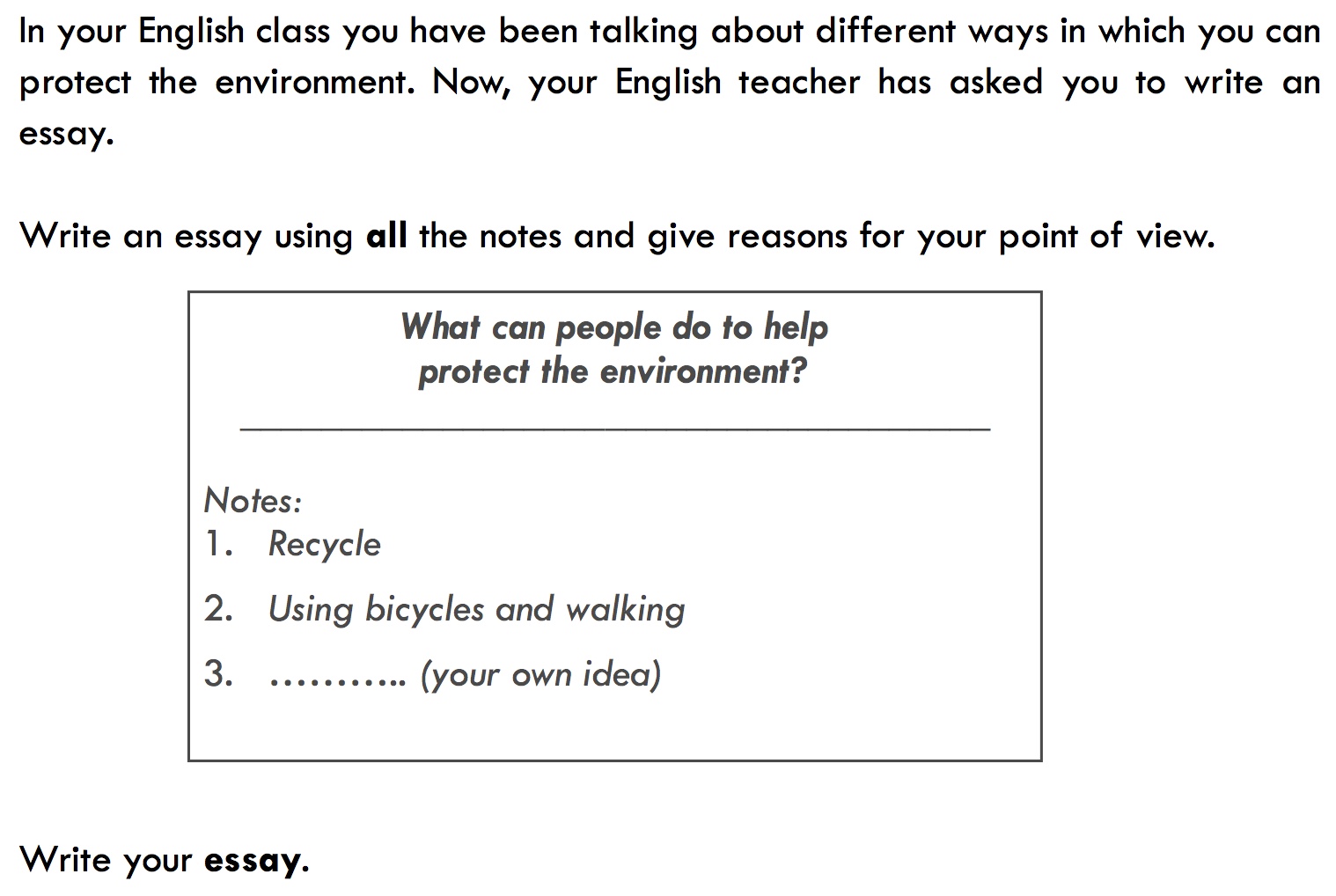
In these instructions, we must pay attention to the following:
- The first paragraph introduces the topic: … different ways in which you can protect the environment.
- The second sentence is usually the same in every task: Write an essay using all the notes…
- In the box , you are given the main topic as a question and they give you something to talk about: recycle, using bicycles and walking, your own idea . As you can see, you have to come up with the third idea, something connected to the topic which is not provided in the exam task.
Given the model task above, each paragraph will correspond to a different idea, apart from the introduction and conclusion. Again, it is only natural to have 5 paragraphs. So, the best way to know how to write an essay for FCE Writing is to take a look at an example of an actual essay for FCE Writing :
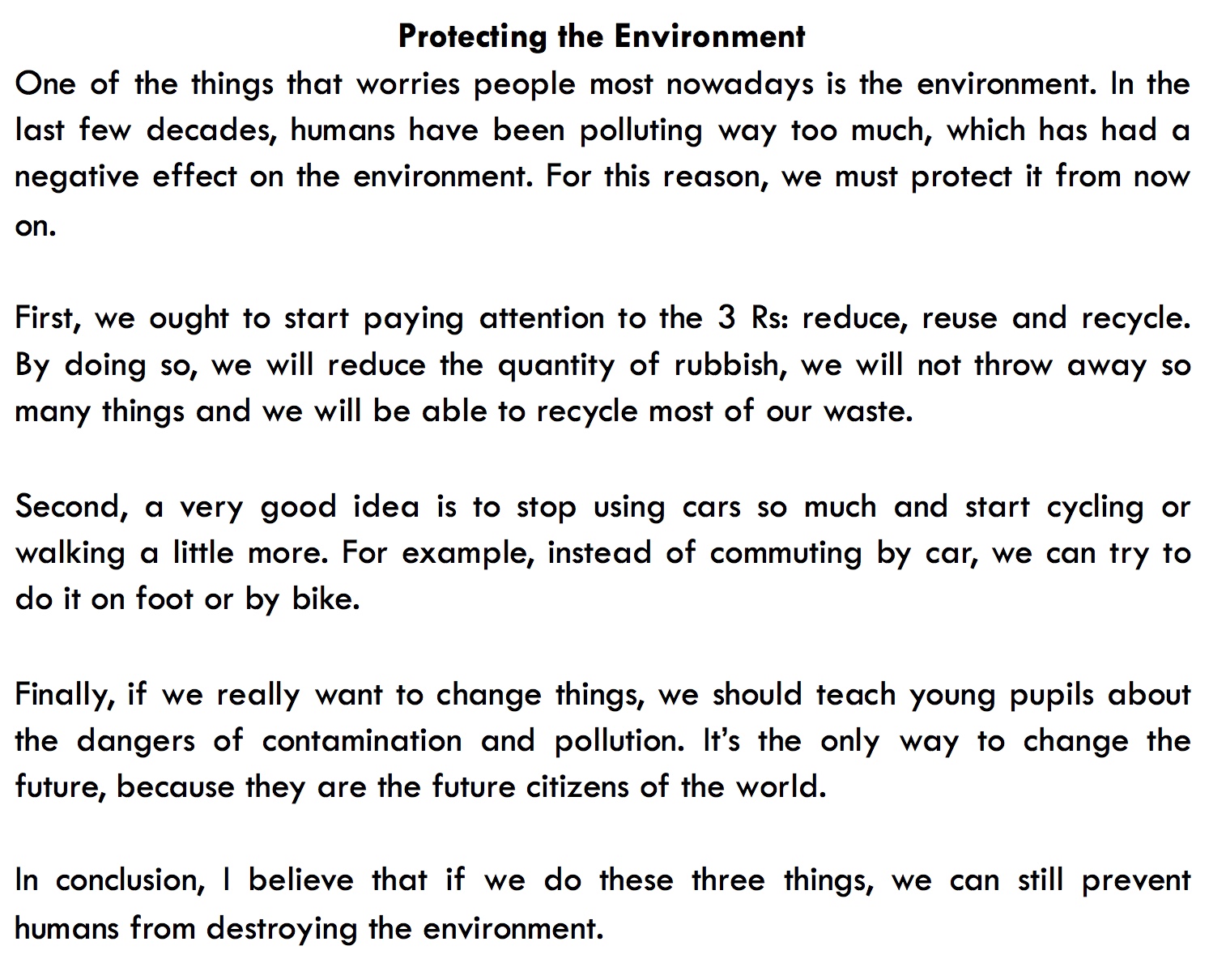
At first sight, the essay has a title and 5 paragraphs (introduction + idea 1 + idea 2 + idea 3 + conclusion). And if we stop to read the essay more carefully, we’ll notice the following things:
- The paragraphs are visual and well defined , which is very important.
- The title summarises the topic of the essay. Another option is to use the question ( What can people do to help protect the environment? ) as title. However, it usually tends to be too long, so I prefer to summarise it into a shorter heading.
- Introduction: it introduces the topic in a general way and it leads to the second paragraph (first idea).
- Paragraph 2: it deals with idea 1.
- Paragraph 3: it deals with idea 2.
- Paragraph 4: it deals with idea 3.
- Conclusion: we express our opinion to conclude and summarise the essay.
- It uses connectors to define the development of the essay: firstly, second, finally, etc.
- It doesn’t use many contractions or pet words.
- One of the things that
- In the last few decades,
- For this reason,
- First, / Second, / Third,
- By doing so,
- For example,
- In conclusion,
This is a good example of an essay for FCE Writing . By the way, you must bear in mind that it has been written to simulate a strong B2 level, without reaching C1.
FAQ: Do I get penalised for writing over 190 words?
This is the most typical question in this part of the exam and the answer is « yes and no «. Let me explain myself. Cambridge English examiners don’t count the number of words and penalise you based upon that fact alone. There’s a rumour going around among teachers and pupils that says that for every 10 words over 190, they take «this many» points off, but it is not true. However, think about this: if you’ve written 50 or 100 words more than asked, you are probably including irrelevant information to the task , right? Now that’s a reason for losing points. In the same way that if you write under 140 words you are probably missing essential information , don’t you think?
For this reason, I always recommend writing up to 10 or 20 words over the limit. In this way, you won’t lose any points for including irrelevant information.
FCE Writing Guide with examples (pdf)
Although I intend to write more posts on how to do each piece of writing for FCE, if you don’t want to wait any more, simply download the official KSE Academy FCE Writing Guide . In this guide you will learn:
- How to write an essay and 3 examples.
- How to write an article and 3 examples.
- How to write a review and 3 examples.
- How to write a report and 3 examples.
- How to write an email or letter and 3 examples.
- Over 300 useful expressions for every FCE Writing .
Would you like to see a sample of this guide? Here it is!
Did you find this useful? Why not share it with other teachers and students of English? Don’t forget to subscribe to our newsletter and to follow us on Facebook, Twitter, Pinterest, Instagram, y YouTube. 🙂
- Clases privadas
- Prueba de nivel
- Condiciones
- Política de privacidad
Cambridge English
- A2 Key (KET)
- B1 Preliminary (PET)
- B2 First (FCE)
- C1 Advanced (CAE)
- C2 Proficiency (CPE)
- Linguaskill
Blog de inglés
- Gramática inglesa
- Phrasal Verbs
- Diferencias
- Enviar mensaje
- 958 964 684
- Calle Arabial 4, 18004 Granada
- Lista de espera
Comienza a escribir y presiona Intro para buscar
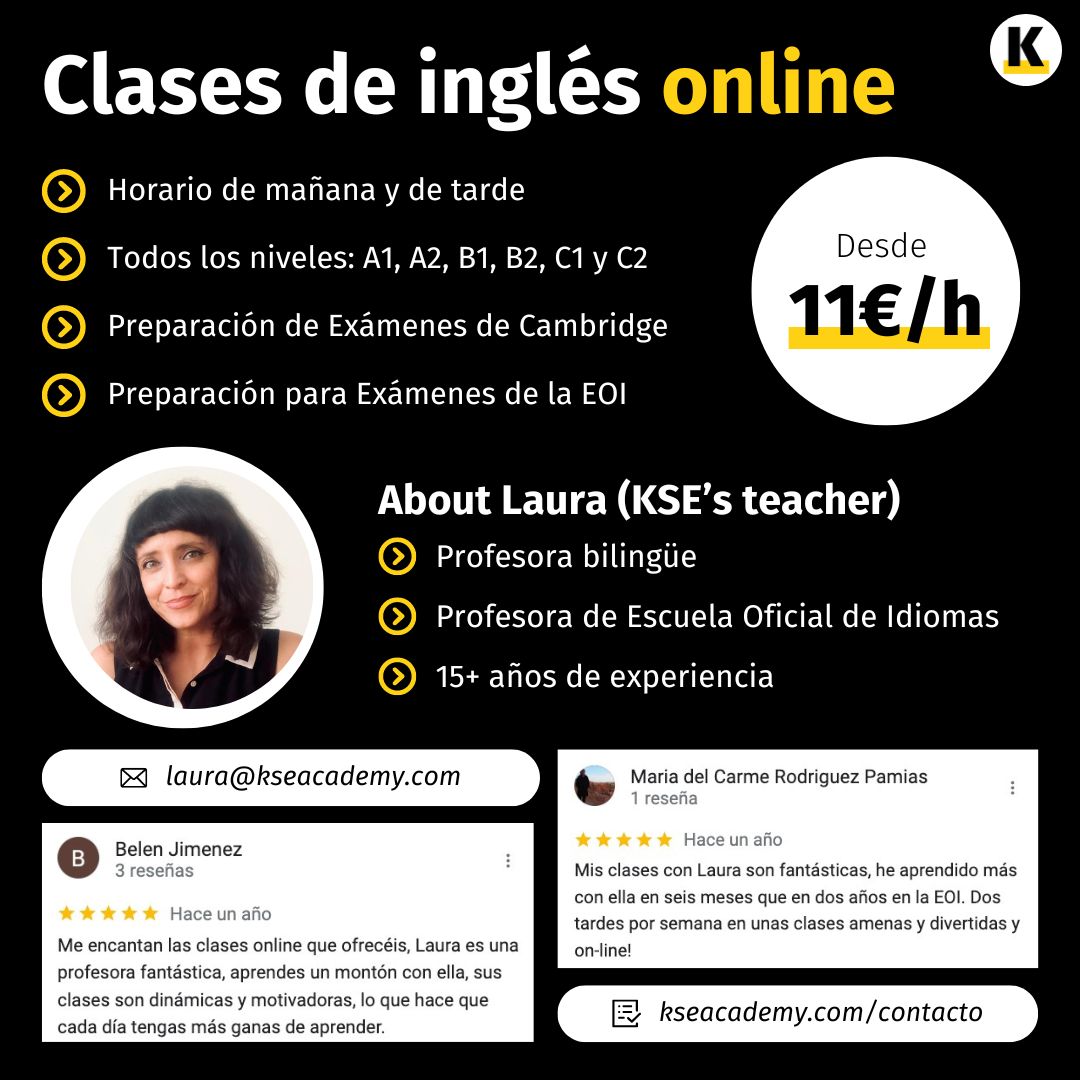

Lesson plans and teaching materials for the Trinity College London GESE and ISE exams
ISE II (B2) Descriptive Essay (Education) Sample Answer and Activities

In this download students go from looking at the characteristics of a descriptive essay to focusing on the functions and language items need for writing one. They then place these language items in a descriptive essay before rewriting it so that it meets the requirements of format and style to pass the exam.
You might also be interested in these resources:
Learning Materials
- Business Studies
- Combined Science
- Computer Science
- Engineering
- English Literature
- Environmental Science
- Human Geography
- Macroeconomics
- Microeconomics
- Descriptive Essay
"The fog comes / on little cat feet." 1 In his poem, "Fog," Carl Sandburg captures the essence of fog by describing it in a pretty unusual way. Yet, fog does move like a cat — silently, smoothly, and disappearing as suddenly as it arrives. Notice how much more interesting Sandburg's description is than simply stating that it's foggy?
Millions of flashcards designed to help you ace your studies
- Cell Biology
A _____ describes an object, place, or concept in deep detail.
Why is learning to write a descriptive essay important?
What are some types of figurative language?
A _____ is an image or saying that has been overused.
A(n) _____ essay creates an impersonal, photograph-quality image of a subject.
A(n) _____ essay attempts to create an emotional reaction with its description.
A(n) _____ essay describes an experience that affected your life.
It is substituting one thing for another to draw an association.
It compares two things using "like" or "as."
It gives an object human-like characteristics.
It is an exaggerated description.
Need help? Meet our AI Assistant

Need help with Descriptive Essay? Ask our AI Assistant

Review generated flashcards
to start learning or create your own AI flashcards
Start learning or create your own AI flashcards

StudySmarter Editorial Team
Team Descriptive Essay Teachers
- 9 minutes reading time
- Checked by StudySmarter Editorial Team
- 5 Paragraph Essay
- Argumentative Essay
- Creative Writing
- Cues and Conventions
- English Grammar
- English Language Study
- Essay Prompts
- Analytical Essay
- Cause and Effect Essay
- Chat GPT Prompts For Literature Essays
- Claims and Evidence
- Expository Essay
- Narrative Essay
- Persuasive Essay
- The Best Chat GPT Prompts For Essay Writing
- Essay Writing Skills
- Global English
- History of English Language
- International English
- Key Concepts in Language and Linguistics
- Language Acquisition
- Language Analysis
- Language and Social Groups
- Lexis and Semantics
- Linguistic Terms
- Listening and Speaking
- Multiple Choice Questions
- Research and Composition
- Rhetorical Analysis Essay
- Single Paragraph Essay
- Sociolinguistics
- Summary Text
- Synthesis Essay
- TESOL (English)
- Textual Analysis
Jump to a key chapter
In a descriptive essay assignment, use sensory and figurative language to help your reader form a picture in their mind. You can divide descriptive essays into three broad formats (a personal essay, formal description , or impressionistic description ) and, from there, into a myriad of topics. After you've chosen your topic, brainstormed your ideas, and created your outline, you can follow the standard format to write your essay.
Fun fact: myriad technically means the number ten thousand!

Descriptive Essay Definition
As the name suggests, when writing a descriptive essay, you aim to describe something thoroughly from a personal, formal, or impressionistic perspective. Descriptive essays share some characteristics with narrative essays, but descriptive and narrative essays' end goals are different.
A narrative essay explores a theme using narrative techniques, while a descriptive essay illustrates an object, place, or concept thoroughly.

Descriptive Essay Formats
You can categorize a descriptive essay as a:
- Personal Essay : a description of a personal experience that affected your life.
- Formal Description : an impersonal, precise report of the subject's characteristics — you are like a camera.
- Impressionistic Description : using descriptive language to create an emotional response in the reader.
Sensory Details
Sensory details refer to the features of the five senses — taste, touch, sight, sound, and smell. When you use sensory details appropriately to describe your subject, you create a moving experience for the audience. As a result, they become emotionally invested and eager to read more. There are a couple of points to keep in mind when using sensory details:
- Make sure your sensory details have a purpose: As you write, ask yourself whether the component you are including is necessary. If it does not add to the point of the essay, leave it out. Too many descriptive details can make your essay sound muddled.
- Follow a consistent pattern in your description: For example, if you describe a flower, choose a starting point and work your way outward. Bouncing around from the stem to the stamen and then back to the leaves creates a disjointed image — similar to a cubist Picasso painting.

Showing Versus Telling
Which is more engaging: Sandburg's creative description of fog or a lengthy, scientific explanation of fog? Where appropriate, using figurative language to communicate the subject of your essay to the reader can create more interest than simply explaining the idea.
Examples of figurative language include:
- Metaphor : substituting one thing for another to draw an association (e.g., "love is a battlefield").
- Simile : compares two things using "like" or "as" (e.g., "as happy as a clam").
- Personification : gives an object human-like characteristics (e.g., "the wind whispered in the trees").
- Hyperbole : an exaggerated description (e.g., "he was hungry enough to eat a horse").
- Symbolism : an object that represents something else (e.g., using a red rose to represent love).
Do the figurative language examples seem really, really familiar to you? Yes? They are all clichés, meaning they are images that have been used too often. If you want your writing to sound unique, avoid clichés like the plague.
Descriptive Essay Topics
You will be describing the topic of your descriptive paper in minute detail, so it's crucial to pick one that excites you. Here are a few example descriptive essay categories and topics:
- Your favorite childhood toy.
- An object that reminds you of a loved one.
- A tree that always catches your eye.
- Your favorite hangout.
- Your favorite vacation destination.
- Your first day of high school.
- Losing your first tooth.
- Your first concert.
A Person/Animal
- Someone you admire.
- Someone you love.
Learning to write a descriptive essay is important because it teaches you how to focus on your writing style and vocabulary. When you describe something in the level of detail a descriptive paper requires, it shows you a different way of engaging with the world around you.
Descriptive Essay Structure
Structure your descriptive essay into a traditional essay format with an introduction , body paragraphs , and a conclusion .
Introduction
Open your essay with a hook to get the reader's attention by choosing a thought-provoking quote or statistic related to your topic or asking a question. Then, introduce the subject by relating it to the hook. Finally, include your thesis statement in the last sentence of the introduction.
Body Paragraphs
The number of body paragraphs you include will depend on the topic and breadth of your essay, but usually, you should include at least three . Focus each body paragraph on a specific feature of your thesis . At the end of each body paragraph , wind down with a transition sentence that carries the subject to the next element or the conclusion .
Wrap up the essay by rewording your subject's thesis and central points. Don't introduce new ideas . The conclusion is the final impression, so keep the energy level consistent .
Descriptive Essay Outline
Before you sketch your outline, give some thought to researching your essay topic. Sources are not usually required for descriptive essays, but pictures, letters, text messages, and conversations can provide vivid details. In addition, brainstorming helps you decide which features make the most sense to include in the essay and how to include them. Experiment with the description's sequence when you write the outline.
Once you have everything figured out, your outline should look something like this:
I. Introduction
A. Hook (e.g., a statistic or quote)
B. Connection between the topic and hook
C. Thesis statement
II. Body paragraphs (number of paragraphs will vary)
A. Main point of the paragraph
B. Description of the main point
C. Transition to the next paragraph or conclusion
III. Conclusion
A. summary of the thesis
B. Summary of the main points
C. Final impression
Descriptive Essay Example
The following example of an abbreviated descriptive essay will give you an idea of what a completed descriptive essay assignment could look like:
Around 11% of Americans have a panic attack every year. 2 For years, I was rushed to the emergency room, sometimes weekly, sure that I was dying. It became more frustrating every time doctors said nothing was wrong with me and sometimes treated me like I was just trying to get drugs. Blood work and vitals were within normal limits, so I was a hysterical patient in their eyes. But, in my eyes, they were missing something. My heart was pounding, I was dizzy, and my chest hurt. A voice loop in my brain kept telling me this wasn't a panic attack, but a panic attack happens unexpectedly, leaving you feeling out of control and like you could die.
My first panic attack happened when I was walking with my kids. The world shifted to the left, and my son asked me a question, but all I could hear was a tinny buzz and a whirl of thoughts fighting with each other, some screaming, "I'm going to die!" and others ordering me to "act normal, don't scare the kids." There's a python wrapped around me, waiting for me to exhale so it can squeeze slightly tighter after every breath , and I freeze because the sidewalk is marshmallow under my feet. The trees stand their ground, brilliantly green leaves fingering the sunlight. I run my hand along a nearby trunk, and its cat tongue bark gives me a lick. The breeze pricks at my skin, giving me goosebumps while I create patterns in the tree's bark — dark lines merging into wizened faces, into pits and curves, taking a chance to smile at my son when the python's grip slips a bit. The image of pretending to be a willow tree while I was in ballet pops into my head. My roots grounded, arms branched and lazily waving. They undulate like a python . Finally, the python slithers away, and I ask my son what was he saying. I had never felt anything like that before.
In a list of many, one of the unnerving things about panic attacks is that they can happen at any time. In addition, their symptoms can mimic serious health emergencies such as a stroke or heart attack. Your brain says you are under attack, and it takes practice to believe otherwise — lots of practice.
Have a look at some of the author's techniques:
The descriptive essay example is personal and impressionistic . It discusses an event that affected the author's life in a way that attempts to make the audience feel something. The long sentence structure mimics the feeling of racing thoughts. The words " buzz " and " pops " are examples of onomatopoeia . The metaphors and simile develop images in the reader's mind. Hyperbole expresses the physical sensation and irrational thoughts.
Onomatopoeia: when a word mimics the sound it describes.

Descriptive Essay - Key takeaways
- Descriptive essays describe objects, places, or concepts in deep detail.
- Descriptive essays can be personal, formal, impressionistic, or a combination of styles.
- Descriptive essays use sensory details and figurative language to show rather than tell the audience about the subject.
- There are numerous options when picking a descriptive paper topic, so choose the one you'll enjoy writing about.
- Researching the descriptive essay topic will help you include vivid details in your writing, brainstorming will help you decide what to include, and the outline will help organize the sequence of the essay topic.
1 Sandburg, Carl. "Fog." Chicago Poems . 1916.
2 "Panic Disorder." Cleveland Clinic . 2020.
Flashcards in Descriptive Essay 16
Descriptive essay
All of the above
Formal description
Impressionistic

Learn with 16 Descriptive Essay flashcards in the free StudySmarter app
Already have an account? Log in
Frequently Asked Questions about Descriptive Essay
What is a descriptive essay?
A descriptive essay describes an object, place, or concept in deep detail.
What are some descriptive essay topics?
Some descriptive essay topics are:
- Your favorite childhood toy
- Your favorite vacation destination
- Losing your first tooth
Learning to write a descriptive essay is important because it teaches you how to focus on your writing style and vocabulary. When you describe something in the level of detail a descriptive paper requires, it also teaches you a different way of engaging with the world around you.
How do you write a descriptive essay?
You write a descriptive essay using sensory images and figurative language to create a picture of the subject for the reader.
What are some examples of a descriptive essay?
Examples of descriptive essays include:
- "A Hanging" (1931) by George Orwell
- "Once More to the Lake" (1941) by E.B. White
- "My Misspent Youth" (2001) by Meghan Daum
Test your knowledge with multiple choice flashcards

Join the StudySmarter App and learn efficiently with millions of flashcards and more!
That was a fantastic start, you can do better, sign up to create your own flashcards.
Access over 700 million learning materials
Study more efficiently with flashcards
Get better grades with AI
Already have an account? Log in
Keep learning, you are doing great.
Discover learning materials with the free StudySmarter app

About StudySmarter
StudySmarter is a globally recognized educational technology company, offering a holistic learning platform designed for students of all ages and educational levels. Our platform provides learning support for a wide range of subjects, including STEM, Social Sciences, and Languages and also helps students to successfully master various tests and exams worldwide, such as GCSE, A Level, SAT, ACT, Abitur, and more. We offer an extensive library of learning materials, including interactive flashcards, comprehensive textbook solutions, and detailed explanations. The cutting-edge technology and tools we provide help students create their own learning materials. StudySmarter’s content is not only expert-verified but also regularly updated to ensure accuracy and relevance.
Team English Teachers
Study anywhere. Anytime.Across all devices.
Create a free account to save this explanation..
Save explanations to your personalised space and access them anytime, anywhere!
By signing up, you agree to the Terms and Conditions and the Privacy Policy of StudySmarter.
Sign up to highlight and take notes. It’s 100% free.
Join over 22 million students in learning with our StudySmarter App
The first learning app that truly has everything you need to ace your exams in one place
- Flashcards & Quizzes
- AI Study Assistant
- Study Planner
- Smart Note-Taking


- Cambridge B2 First (FCE): How to Write an Essay
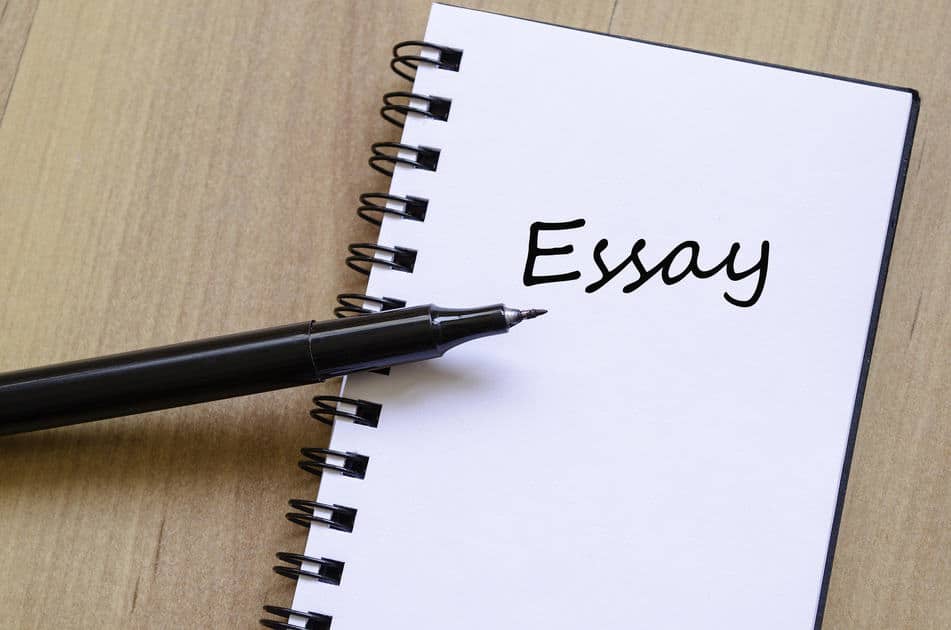
Essay writing is easier than you think
The very first reaction I usually get when I want to practise essay writing with my students is wild panic. Everybody around me starts rolling on the floor crying and screaming. I try to calm them down, but there is no way of doing it and eventually all of them quit and tell me that they will never be able to pass the FCE exam.
Of course, this was a little bit of an exaggeration, but it is true that most students get stressed as soon as they here the word essay when, actually, there is no real reason for that. In fact, essay writing might be the easiest type of writing in Cambridge B2 First because there is a plan that you can follow every single time you sit down with pen and paper to practise as well as in the exam itself.
So, let’s look at essays, how they are organised and what exactly you have to be careful with in order to pass easily and get the high marks you deserve.
- Cambridge B2 First (FCE): How to Write an Email/Letter
- Cambridge B2 First (FCE): How to Write a Review
- Cambridge B2 First (FCE): How to Write a Report
- Cambridge B2 First (FCE): How to Write an Article
What a typical essay task looks like
Looking at different essay tasks, the first thing that students often realise is that all tasks look the same. Their structure doesn’t change, which gives you the advantage of being able to plan a strategy before you even take the exam. Every time you practise is like the real exam.
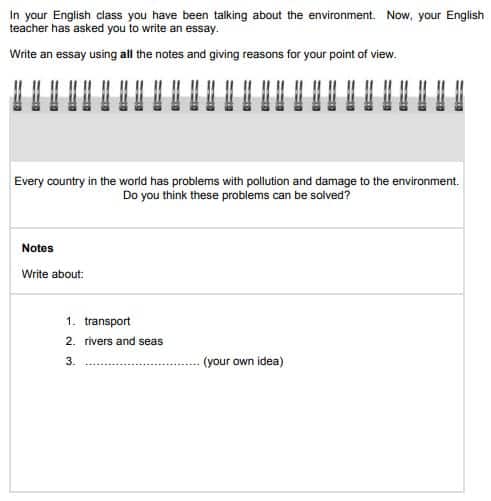
Above there is a typical essay task. As you can see there is not a lot of information, but we still have to look at it carefully and decide what we are asked to do exactly.
The first step is always to underline the key points in the task so you know what to do and what information to include in your essay.
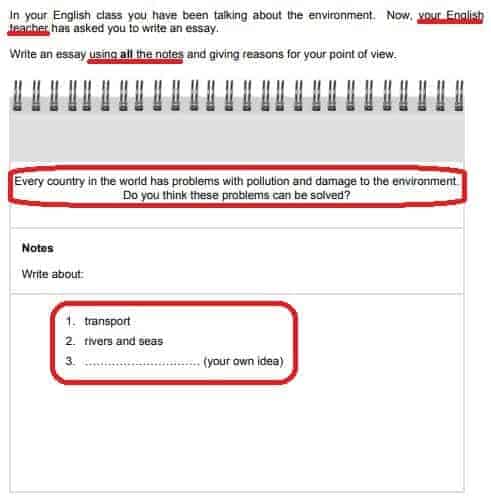
In the image above I underlined and circled the most important information for you. When you look at a writing task – and I mean every kind of writing task, not only essays – you should think about two things: what you have to include in your text and who is going to read it.
While the first point seems obvious students often forget about the second one and miss out on higher marks. In our example your English teacher is going to read the essay. What does that mean for you when you write it? Think about the style and tone of the language you are going to use. Does your English teacher expect informal language like in a text message to your best friend or should it be rather formal? I think you understand what I mean.
Choosing the correct register and tone (formal English) for your essay will earn you higher marks so don’t forget about it.
The second point we need to consider is what we have to write about. In every essay task there are a situation/topic (problems with pollution and damage to the environment), a question for you to answer (Do you think these problems can be solved?) and three topic points (transport, rivers/seas, your own idea).
You must deal with all these things if you want to pass with high marks. If something is missing you will lose marks. That includes your own idea. I see it all the time that students write about the two ideas given in the task, but they ignore the fact that they have to add a third topic on their own. Don’t make the same mistake. Always write about all three topic points.
With this flood of information the next step is to think about how we can organise our essay. Luckily, there is a plan that works and I’m going to share it with you.
The 3 main parts of an essay
Looking back at our example from before we can see that there are three topic points which we need to deal with: transport, rivers and seas as well as your own idea.
I think it is not difficult to see that we can turn these three topics into three paragraphs, one for each idea. These three paragraphs are called the body of the essay. However, an essay wouldn’t be an essay without an introduction at the beginning and a conclusion at the end. All together that’s five paragraphs and we could structure it like this:
- Introduction
- Rivers and seas
- Your own idea
With an introduction, body and conclusion every essay has three main parts. You can follow this for any essay question in the FCE exam and it works every single time.
Yeah, it sounds good to me too. 🙂
But what exactly do we have to include in these different parts? Let me give you an overview so you get a better idea.
When I read the introduction to an essay I can often tell immediately if the essay is going to be great or if the student needs to work more on it. Think of the introduction as an appetizer before the meal begins. It gives you an idea of what to expect so you don’t want to disappoint the reader from the start.
Your introduction should always put the topic in the context of today’s world and paraphrase the question of the essay. It is also a good idea to include your opinion so the reader knows from the beginning what you think.
Let’s have a look at an example introduction for an essay about the above topic:
More and more countries and cities struggle with dirty air and water and while it is difficult to find a solution to these issues, I believe that there are ways to improve the situation and to protect the environment.
In this introduction all the key elements are covered. The topic is put in context (“More and more countries and cities struggle with…”), the question is paraphrased (“…while it is difficult to find a solution to these issues,…”) and the candidates opinion is clear (“I believe that…”).
All you need to do is to memorise this formula and use it in every essay you write. The examiner and you will be happy. 🙂
The body is like the meat in a hamburger. It’s the best part and you want it to be full of flavour. For your essay it means the following:
Each paragraph of the body starts with a topic sentence which introduces the main idea of the paragraph. After that, you add reasons, examples and you can even acknowledge other points of view.
A great topic paragraph in the body doesn’t just talk about advantages and disadvantages. Think about how you can support the message in your topic sentence to convince the reader.
Here is an example for you.
Firstly, congestion on roads not only in major cities, but also in smaller towns causes a lot of pollution and noise and even though this situation seems to get worse and worse many countries are trying to encourage people to use alternatives like electric cars, which is a good first step to deal with this kind of challenge.
In this example paragraph the candidate simply followed the formula from above. The first sentences states what the problem is. After that, she acknowledges that the issue seems pretty bad, but then she explains different alternatives to cars that could improve the situation.
Also, notice the different linking expressions she uses in this paragraph (Firstly, not only…but also, and even though, which is). Examiners like a variety of linking words and phrases to connect your ideas so try to include them in your essay.
That’s really all you need to do. Repeat the same process for the other two topic points and you should be able to impress and achieve great marks.
Last but not least, a good essay is rounded off with a nice conclusion. Here, it is your job to tie everything together like a Christmas present. You don’t want the gift wrapping paper or the bow on the present to be ugly so make sure that you conclusion is on point.
In a good conclusion you should summarise the essay in one sentence and clearly state your opinion on the question one last time.
I told you above that the introduction is there to make a good first impression on the reader. The conclusion plays the role of giving a good last impression. You don’t want the examiner to be happy until the end and then read a conclusion that is only average. Make sure that every part is great.
To sum up, our environment needs our help and although the air we breathe as well as waterways in many parts of the world are heavily polluted I strongly believe that we can solve these issues if governments and the people work together.
The first part of this conclusion summarises the problem one last time and in the second half the candidate clearly states her opinion and that’s it. Don’t make your life harder than it already is and instead focus on the criteria that really matter.

Plan before you write
Earlier we had a look at the different paragraphs in an essay and I told you that five is a good number. A lot of students take this information and jump straight into writing as soon as they see the task.
Stop right there! When you plan to improve something around your house or in your apartment, do you just run to the store and buy five buckets of paint or do you think about the size of the room and how much paint you need, what colour you want and what kind of brushes and paint rollers you will have to get?
Treat your essay like a home improvement project and make a plan before you start writing. It only takes five minutes, but, in the end, it can save you time because once you start, you don’t have to worry about ideas any more…it’s all there in your notes.
To create a plan make a list of the five paragraphs of your essay. As we said before this could be something like this:
Now, all you have to do is to add a few words to each point so you won’t forget what you want to write about. I thought of a few things for our example task:
- Introduction – problems with pollution, is there a solution?
- Transport – -: CO2 emissions, noise +: electric cars
- Rivers and seas – -: sea life and plastic +: projects to clean oceans
- Animal agriculture – -: CO2 emissions, excrement +: vegan/vegetarian lifestyles, sustainable farms
- Conclusion – summary, it’s a big problem but there is hope
It took me about three minutes to write this and if I wanted to write the full essay, I would have all the ideas I need already in front of me. The next step would be to add more information to each point and voilà, the essay is done.
How your essay is marked
Marking FCE writing tasks is like a science and for a lot of students it feels as if there is this big mystery and nobody really knows how it works. Actually, there are very clear rules that the examiners have to follow and the criteria are publicly available.
While it is possible to find all the information on your own I thought it would be a good idea to put everything together in an article for you. Check out how your writing tasks are marked by clicking here .
Practice makes perfect
I hope that my article is going to help you with your essays. As you saw you can analyse and structure every task the same way. With all your new knowledge the only thing you have to do is start practising. If you put in the time and work, essay writing will become quite easy and you can focus on other areas of your English that need more improvement.
Lots of love,
Teacher Phill 🙂
Similar Posts
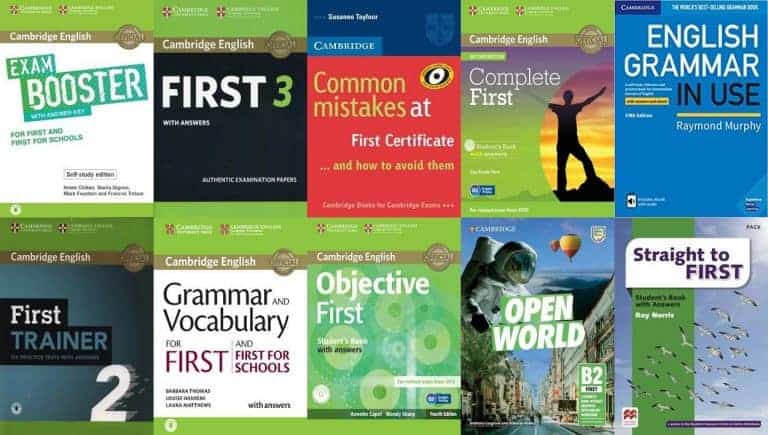
Cambridge B2 First (FCE): The 10 Best Books to Study for the Exam
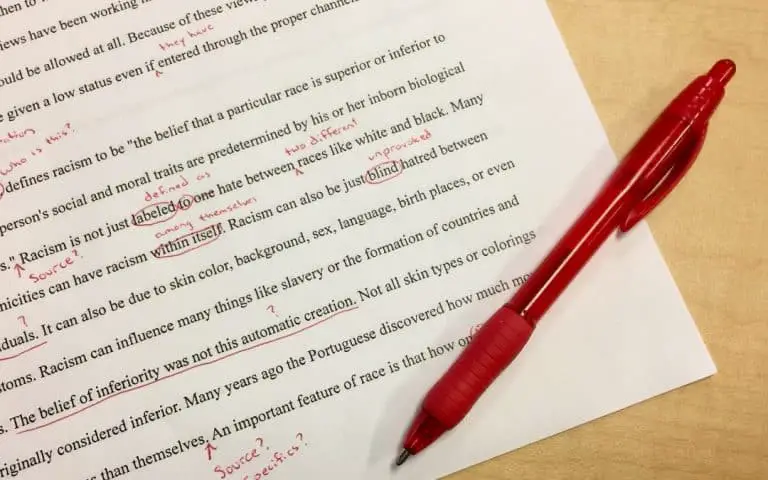
Cambridge B2 First (FCE): How your writing is marked

Cambridge B2 First (FCE): How to calculate your score

Cambridge B2 First (FCE): Listening Distractors

Cambridge B2 First (FCE): Reading & Use of English Part 6
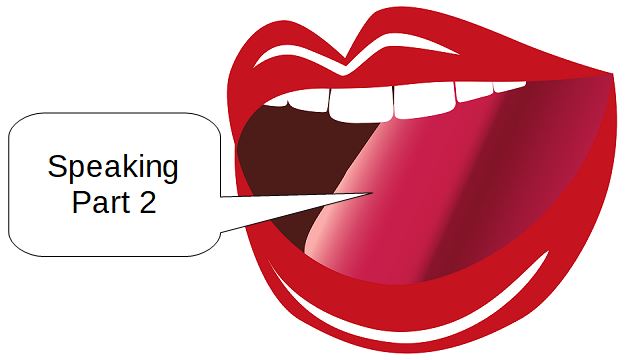
Cambridge B2 First (FCE): Speaking Part 2
Hi, Phill! Thanks a million for your fine tips on how to write an essay and the clear video instruction as well as brilliant associations with present giving ( like wrapping paper, a present bow and so on) while talking about a conclusion.
Hi there! I have a question about the type of task in the essay. I know we are usually asked to write an opinion essay, but is it possible to get a task where we are asked to write a for and against essay? How can I tell these two tasks apart? Thank you very much for you help! Your blog is really useful. 🙂
You might get a question in the essay that asks, for example, for advantages and disadvantages of a certain topic, but you always have to include three specific topic points. Because of this, you can simply choose which topic points you see as advantages and which ones as disadvantages and write three topic paragraphs. The structure stays the same, you only change the content so it fits the question.
I hope this helps. 🙂
Comments are closed.

IMAGES
VIDEO
COMMENTS
This format has 5 paragraphs in total. The sequence of the paragraphs is as follows; Introduction. Body Paragraph 1. Body Paragraph 2. Body Paragraph 3. Conclusion. Following is an example of a descriptive essay written using the famous 5 paragraph method. 5 Paragraph Descriptive Essay.
FCE Essays - Sample/model answers and examiner comments. An essay is always written for the teacher. It should answer the question given by addressing both content points and providinga new content point of the writer's own. The essay should be well organised, with an introduction and an appropriate conclusion,and should be written in an appropriate register and tone
Here's a useful structure for an opinion essay:Paragraph 1Intro. uce the topic using a general statement and give your. hether you agree or disagree with the statemen. .Paragraph 2Give the first reason to support your opinion. Provide specifi. s for your opinion, using examples if necessary.
The use of literary devices such as personification and metaphor makes the banyan tree in the second example come to life. This is how you can make your writing more vivid, descriptive, and poetic. 2. Use your senses. Sensory descriptors are one of the most important aspects of a descriptive essay.
Each paragraph has a clear purpose: Introduction: it introduces the topic in a general way and it leads to the second paragraph (first idea). Paragraph 2: it deals with idea 1. Paragraph 3: it deals with idea 2. Paragraph 4: it deals with idea 3. Conclusion: we express our opinion to conclude and summarise the essay.
In this download students go from looking at the characteristics of a descriptive essay to focusing on the functions and language items need for writing one. They then place these language items in a descriptive essay before rewriting it so that it meets the requirements of format and style to pass the exam. €0.99 - Purchase.
The descriptive essay example is personal and impressionistic. It discusses an event that affected the author's life in a way that attempts to make the audience feel something. The long sentence structure mimics the feeling of racing thoughts. The words " buzz " and " pops " are examples of onomatopoeia.
These three paragraphs are called the body of the essay. However, an essay wouldn't be an essay without an introduction at the beginning and a conclusion at the end. All together that's five paragraphs and we could structure it like this: With an introduction, body and conclusion every essay has three main parts.
Tips for writing descriptively. The key to writing an effective descriptive essay is to find ways of bringing your subject to life for the reader. You're not limited to providing a literal description as you would be in more formal essay types. Make use of figurative language, sensory details, and strong word choices to create a memorable ...
Descriptive Essay Examples with Downloadable PDF. A descriptive essay is one potent way of bringing out a mental picture that may drop the reader right into the middle of the action. It calls for and encourages the use of imagination for exploration through sensory details and evocative language.